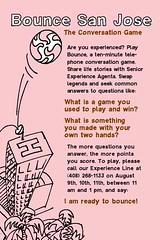Last week at the 2006 International Symposium for Electronic Art (ISEA), I had the first opportunity to conduct a public playtest of Bounce, a senior social network game.
The game combines a single-player online flash interface with live multi-player phone conversation... for now, via personal phones, but soon via Skype.
The goal of the project is to connect senior citizens with players of other, younger generations, so that online social networks don't split across generational lines, a kind of My Space versus Eons.com phenomenon. Instead, during the game, players of different generations form social connections with each other, discovering what specific life experiences they have in common, even as they swap stories of very different, rich lives. They seek highly specific, true, common answers to questions such as:
What is an exotic animal you both have touched? What is an unusual body of water you both have been swimming in? What is a fantastic cure that has worked on you both?
The playtest, conducted in cooperation with the Almaden Senior Center in San Jose, was a smashing success. The phones rang off the hook, to the point that we expanded our phone database by three lines to handle the calls. The seniors, most of whom did not prior to the test consider games a medium they would choose to engage with normally, had a fantastic time playing. They wanted to play multiple times, gave us terrific positive feedback, and we had above an 80% return rate from our first day of testing to our second day of testing... that means they liked the game enough to come back to play again! Indeed word of the game spread through the senior center, and I was just thrilled with how engaging and positive and iterable an experience it turned out to be.
Non-senior callers were terrific too-- as the playtest unfolded, we started receiving calls from all over the country from people who had received emails, IMs and phone calls from friends who had just played. These folks essentially told us "A friend of mine just gave me this phone number and told me to call"--so we had the fantastic challenge of engaging them from scratch.
On a sentimental note, Bounce was my last UC project, no doubt, now that I've filed my dissertation. (Bounce is a collaboration with fellow UC Berkeley researchers Irene Chien, Ken Goldberg, and Greg Niemeyer.) However, the playtest was such a success, I am certain at the very least that there will be more bouncing in the future! Look for more public playtests, a more robust online system (the system this post links to is very buggy and unpolished, but if you're curious, it will give you a basic idea of the interactive design), and some research articles.


2 comments:
A delightfully inspiring report on a well-designed and implemented game [experiment]!
It sounds like the game not only bridged the gap between the individuals who were participating, but may have made significant strides in bridging larger cultural, social and technological gaps as well!
Another story I recently read, about interactions between a 79-year-old British pensioner, Peter, and a large number of [mostly young] viewers on YouTube (cf A Different Kind of YouTube Experience), is further evidence that there are tremendous benefits to be realized through recent technological innovations ... hysterical overreactions such as the recently passed Deleting Online Predators Act (about which danah had some fabulous insights to share) notwithstanding.
I hope that the Bounce experience will get the press it deserves!
NICE SITE AND NICE JOB!!! VISIT US AT http://www.enterbet.com
Post a Comment